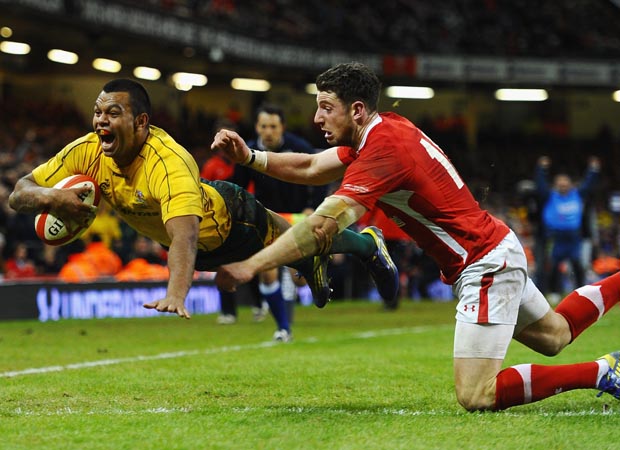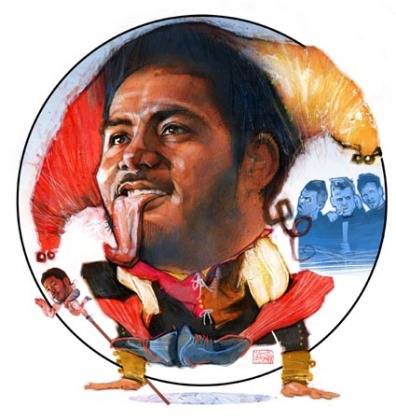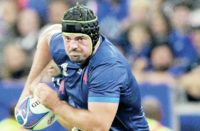 There is always a danger in professional team sports like rugby that brilliant players who are different – idiosyncratic in their habits, slightly autistic, have angry young man syndrome, or maybe are just plain immature – are marginalised. “Non-conformists not welcome,” is the message. They upset the team dynamic.
There is always a danger in professional team sports like rugby that brilliant players who are different – idiosyncratic in their habits, slightly autistic, have angry young man syndrome, or maybe are just plain immature – are marginalised. “Non-conformists not welcome,” is the message. They upset the team dynamic.
That was the word broadcast by the New Zealand mental skills coach Gilbert Enoka in an interview this week when he was touted as the man responsible for turning the All Blacks from chokers into world champs.
As Enoka explained his role as the guardian of the team's culture and conscience, the former volleyball international and PE teacher let rip at those who do not easily sublimate themselves to the All Black code, referring starkly to what he termed its “no dickhead policy”.
There was an element of zealotry as Enoka elaborated: “The dickheads and the poseurs who are not genuine about adding to this wonderful legacy just don't survive. They become one-Test ponies and get chewed up and spat out relatively quickly.”
While some of the psychological method Enoka talked about made sense, other parts seemed to descend into the realms of exaggerated claims and psycho-babble.
For instance, Enoka's claim that the transference of power from the coaches to a player leadership group is what makes the All Blacks unique simply does not stand up to scrutiny. There is nothing unique about it. Kitch Christie empowered the likes of Francois Pienaar, Joel Stransky and Balie Swart when South Africa won the World Cup for the first time in 1995, just as Rod Macqueen did with the Wallabies' inner circle of John Eales, George Gregan and Stephen Larkham in 1999. The same was true of Clive Woodward's rapport with Martin Johnson, Lawrence Dallaglio and Matt Dawson in 2003.
There's plenty right with an All Black team-bonding policy that every player in the team takes a turn at sweeping the changing room after each game, although it begs an intriguing question: Does that include away games, too? Did an All Black sweep their Twickenham locker-room floor clean?
However, Enoka's assertion that, “the (All Black) jersey can hunt out flaws as quickly as you can look at it”, as if the latest ‘blackest ever', tight-fitting, slippery AIG-sponsored shirts unveiled in London this week were fitted with the latest dickhead detectors, is pure fantasy.
Thankfully, New Zealand RFU chief executive Steve Tew, brought things back down to earth at the shirt launch when he commented: “The jersey is very important, but it's the guy inside it that makes it.”
 Which brings us back to the players, and those non-conformists who might not leave their entire ego at the door, and sometimes due to the exuberance of youth, or poor judgment, make mistakes.
Which brings us back to the players, and those non-conformists who might not leave their entire ego at the door, and sometimes due to the exuberance of youth, or poor judgment, make mistakes.
With blokes in their early 20s it might just be that they lose the plot when they are out on the town and ‘under the influence', just as Aaron Cruden did when the fly-half missed the All Black squad assembly prior to their departure for their Rugby Championship fixture in Argentina at the end of September.
As a first-time offender Cruden was treated relatively lightly for an incident which was described as out of character, being served with a two-Test ban. In fact, New Zealand are no different from any other side when it comes to their boys hitting the bottle and getting themselves in a spot of bother, despite Enoka's reverence for the jersey.
Israel Dagg and Cory Jane did so during the last World Cup, and former scrum-half Jimmy Cowan was a serial offender. So was Zac Guildford, the wing who is now on Clermont's books. Sometimes it's not drink related. The latest try-scoring sensation, Julian Savea, has, like his predecessor Sitiveni Sivivatu, been involved in assault charges brought by their partners after domestic disputes. Savea avoided being charged only after he agreed to a police demand to complete an anger management course (the incident was not classified as serious), while Sivivatu also escaped prosecution.
England have their jack-the-lads, and Australian rugby dubbed their young misfits the ‘brat pack'. Stuart Lancaster dropped Danny Care for the entire 2012 Six Nations after a second drink-related incident in a matter of weeks saw him charged with drink-driving, while Harlequins fined him £10,000. Manu Tuilagi copped a £3,000 RFU fine for jumping off a ferry into Auckland harbour as the last act of England's ill-fated 2011 World Cup campaign. Danny Cipriani has only just made it back into the Red Rose reckoning after five years of appearing more in the celebrity circus columns than the sports pages.
As for the errant Aussies, after having his Wallaby contract revoked for breaking curfew during the 2013 Lions series and then getting on a plane in a tired and emotional state, James O'Connor is turning it on for Toulon. Meanwhile, Kurtley Beale's rap sheet is one of the longest in the game, with his latest fine of £24,500 for sending offensive text messages one of the biggest handed out.
What strikes you most about every one of the names above is that they are all exhilarating players with exceptional gifts, capable of lighting up arenas around the world with moments of magic that get people on their feet, whether in the stadiums, pubs, or in front of the TV at home.
This argument is not about putting the individual above the team, because in our sport the interests of the team justifiably come first – and that demands a significant degree of conformity to shared rules and culture.
However, without tolerance for maverick self-expression pro rugby could become a dull, monochrome version of a vibrant game.
Individuality should be cherished, even if it has flaws that set off the red light on Enoka's “dickhead detector” from time to time.
*This article was first published in The Rugby Paper on November 9.


























